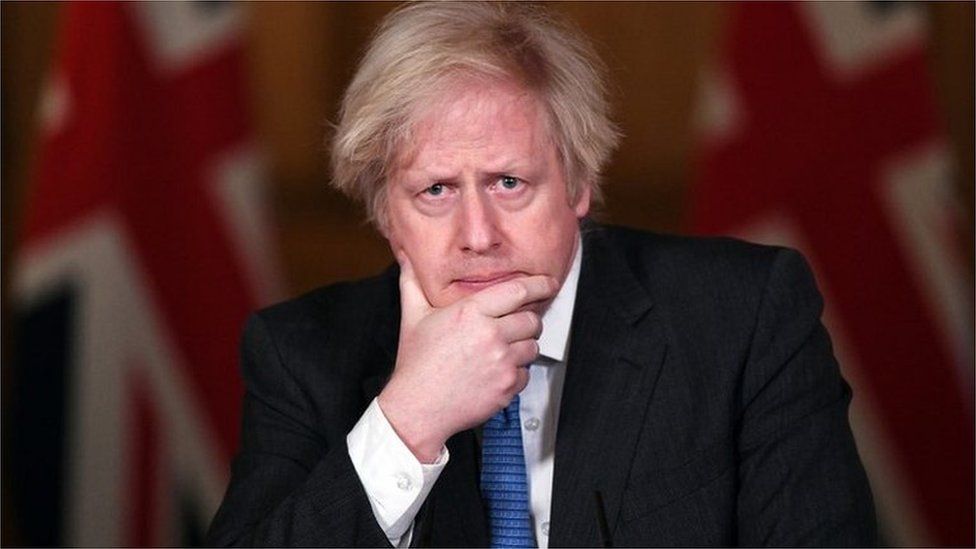Covid-19: Johnson still working on 'roadmap' to ease lockdown
- Published
- comments

Prime Minister Boris Johnson is to spend the weekend finalising his "roadmap" for easing Covid restrictions in England and opening up the economy.
The government is "crunching the numbers" ahead of Monday's announcement, Foreign Office minister James Cleverly said.
New data is expected to suggest vaccines have cut transmission rates.
But Downing Street has refused to comment on the likely contents of the unlocking plan amid press speculation.
The prime minister has said his top priority will be the re-opening of schools.
The government has long planned to get all pupils in England back to the classroom on 8 March - but teachers' unions say the return may need to be "staggered" to allow for Covid testing.
Ministers are also under pressure to re-open pubs, restaurants, shops and the tourism industry - but scientists are warning against a swift return to relative "normality".
Mr Cleverly told BBC Breakfast the prime minister would set out plans for easing restrictions "in as much detail as he is able" in his long-awaited "roadmap" statement to Parliament on Monday.
"But we cannot give guarantees, because that is not how viruses work," he added. "Ultimately we want to open up society, the economy, as much as we are able, but only on the condition that it is safe to do so."
Mr Cleverly would not be drawn on whether the government could allow holidays to take place at home and abroad this summer, saying: "We are assessing the numbers."
The devolved nations of the UK have the power to set their own restrictions, and have been moving at different speeds:
- In Scotland, the government hopes to publish a route of lockdown next week, but First Minister Nicola Sturgeon has urged people not book Easter holidays
- In Wales, First Minister Mark Drakeford has announced up to four people from two different households can exercise outdoors together from Saturday. He said he hoped the "stay-at-home" requirement could end within three weeks, with some non-essential shops and hairdressers possibly reopening at the same time
- Northern Ireland's health minister has played down the prospect of restrictions being eased in time for Easter - a review of current measures will take place on 18 March
Analysis
By Philippa Roxby, health reporter
Now that more than 16 million of the UK's most vulnerable have been vaccinated, the next step is to find out the impact.
Less than 10 weeks after the programme began, there are hints in data on over-80s in England that deaths in that age group are falling more quickly than in other age groups.
This was always the hope - that vaccines would prevent people dying and becoming seriously ill in the oldest first, reducing pressure on hospitals and protecting those most at risk.
The impact of vaccines on numbers infected may not change for a while yet though - that depends on how good the vaccines are at stopping the spread of the virus, which was always more uncertain, although the signs from early studies are promising.
In any case, lockdown restrictions appear to be having their own impact with infections falling every two weeks.
When analysed alongside how hospitals are coping and figures on new variants, politicians will then have the difficult task of deciding on the path ahead.
A further 12,057 Covid cases were reported across the UK on Thursday, down from a daily peak of more than 60,000 in January.
Another 454 deaths within 28 days of a positive test were reported, from a high of more than 1,800 in January.
And more than 17 million people in the UK have now received at least one dose of a Oxford/AstraZeneca or Pfizer vaccines.
But concerns are high over the rapid spread, worldwide, of new coronavirus strains.
The Daily Telegraph is reporting that government figures - due to be published soon - will show the jabs have cut UK transmissions and infections by two thirds.
Prof Neil Ferguson, the epidemiologist whose modelling prompted the first English lockdown, told BBC Radio 4's Today programme the UK could be "a very different country" by the end of May.
He added: "We will still have rules in place but… I think society will be a lot more normal."
Prof Ferguson said two key bits of data - the infection rate and the effectiveness of vaccines - were "looking promising", but it would take "quite a long time" to assess the situation fully.
Prof Adam Finn, a member of the Joint Committee on Vaccination and Immunisation, said it was still not clear what effect injections were having on overall coronavirus transmission.
Most people immunised so far were "elderly", he said, and "not mixing that much within the population".